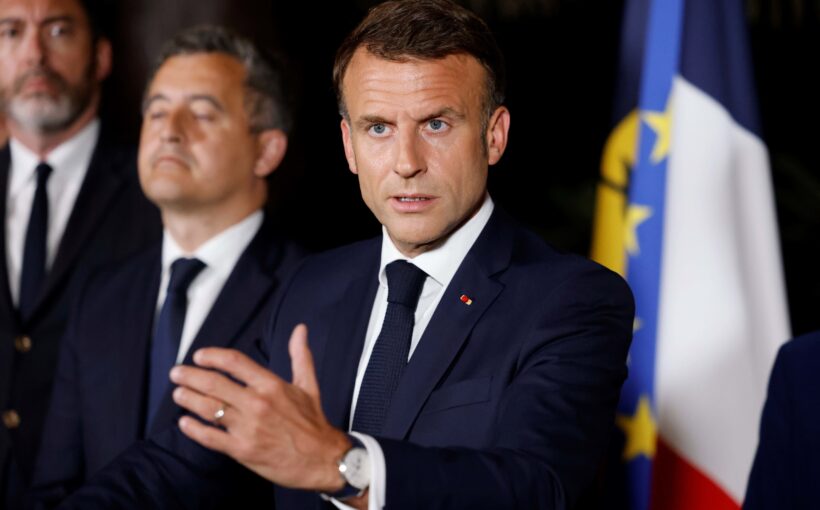To get to power, Keir Starmer’s Labour party has aimed to “de-risk” its image and present itself as trustworthy and stable. That appears to have paid off domestically, but it contrasts with the near impossibility of derisking foreign policy.
Apart from anything else, Starmer cannot control the ideological preferences of his counterparts in other countries, particularly in Europe. And he comes to power at a tumultuous time for many of them. These are some of the key players the new prime minister will be in touch with in the days and weeks ahead.
Emmanuel Macron
Starmer comes to power at a time of great strain for Emmanuel Macron. The French president underestimated the clarion call that the far-right Rassemblement National (RN) party has had on the French populace and inexplicably bounced his country into a snap election. The far right’s strong showing has left Macron looking emphatically unsure domestically, and less of a big hitter regionally.
Cynics could argue that Macron’s weakness strengthen Starmer’s hand should he be seeking a better deal with France on managing cross-channel migration. Starmer could also enlist the French president in a charm offensive to regain influence in the European Union. Starmer has been adamant that he would not be seeking re-entry to the EU or even the single market but that he believes he could get a “better deal” with the bloc than his predecessor, Rishi Sunak.
However, Macron’s failed attempt to defend his own brand of centrism in France raises questions about what kind of French partner the UK will be working with in the future.
Olaf Scholz
While a disjointed French presidency would normally please Germany’s leadership, the recent European parliament elections gave German chancellor Olaf Scholz’s Social Democrats their worst federal results in over a century. This means Scholz, like Macron, is dealing with his own far-right woes domestically.
A weakened Scholz is less likely to lead regionally, which in turn dampens the chances of various bilateral agreements being struck with the UK under its new government. Germany has already been accused of dragging its feet over its commitments to the European Union, from supporting Ukraine to bungling the EU budget and mismanaging climate change policies.
Viktor Orbán and Giorgia Meloni
For other leaders, like Hungary’s Viktor Orbán and Italy’s Giorgia Meloni, the EU elections confirmed the appeal of rightwing politics to voters. Both leaders have based their appeal on anti-immigration and eurosceptic stances. Labour will need to prevent a similar trend in the UK, whether it comes from a rump of Conservative MPs or Nigel Farage’s Reform UK. Rightwing populism is not going away in the UK, and it is decidedly here to stay in Europe.
The case of Orbán in Hungary poses a particular challenge. Emboldened by support at home for his far-right policies, Orbán is a major disrupter in Brussels, thwarting everything from EU budgets to support for Ukraine. Hungary holds the rotating EU presidency for the latter half of 2024 and Orbán is promising to “make Europe great again”.
Starmer will need to navigate Orbán’s deep-seated aversion to the EU and Nato and this work will begin immediately. The new prime minister is to greet European leaders for a summit in the UK on July 18.
On the bright side for Starmer, Orbán’s courting of Italian prime minister Giorgia Meloni has yielded little by way of a far-right faction in Europe. The leaders and their respective parliamentary groupings – both at home and in the European parliament itself – are too ideologically split to find common ground. Starmer could exploit this, driving a centre-left wedge into far-right domains, but, more usefully, identifying what possible bilateral opportunities exist for the UK itself.
Ursula von der Leyen
The European elections were certainly bruising but for some of Europe’s leaders but others, like European Commission president-presumptive Ursula von der Leyen, have been buoyed. The moderate European centre has largeely held, and von der Leyen’s coalition looks set to retain its influence in European institutions. This is good news for Starmer. A strong centrist influence over EU institutions matches Labour’s anticipated positioning on Europe and could kickstart an overdue UK-EU rapprochement.
Nato
The most challenging issue for Keir Starmer will be to work with EU and Nato allies to support Ukraine in its fight against Russia’s illegal invasion.
For four years, Orbán has opposed and undermined the EU’s efforts to support Ukraine. Alongside France, Germany and the US, the UK’s support for new Nato secretary general Mark Rutte will be crucial. Backing Rutte’s leadership, especially on the alliance’s role in financing the war effort and training Ukrainian troops, will be vital at the July Nato summit in Washington.
Britain’s new prime minister will spend his first weeks in office meeting reliable Nato allies but also a disordered European terrain full of traditional intra-institutional EU challenges on the one side, and fiercely-held ideological positions on the other. Job one for Starmer and his government is to indicate from the get-go its own foreign policy preferences – both in relation to Europe and the wider world.
![]()
Professor Amelia Hadfield has previously received Erasmus + funding from the European Commission.



